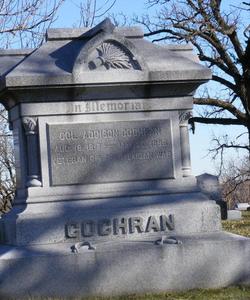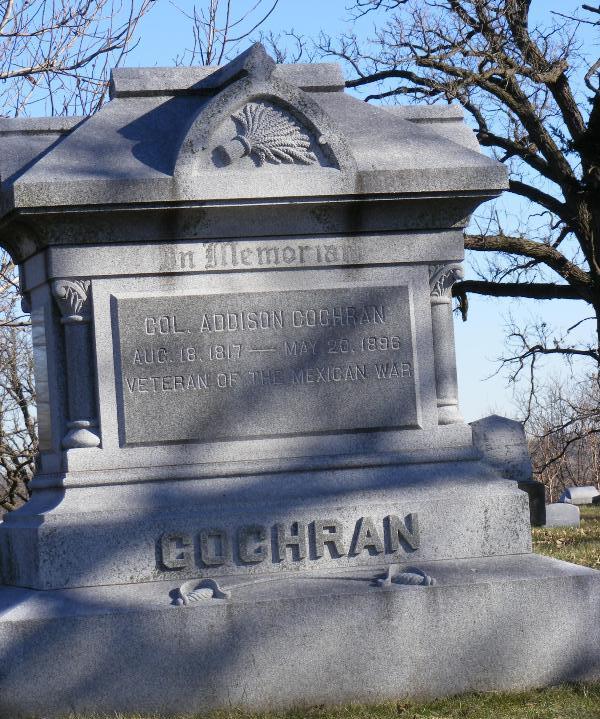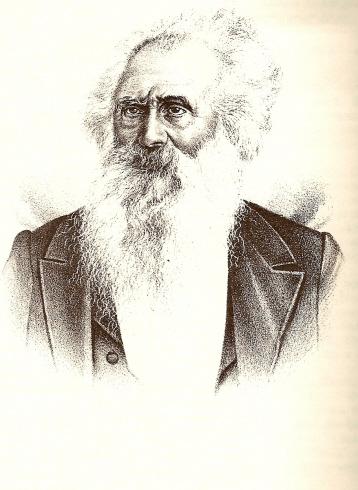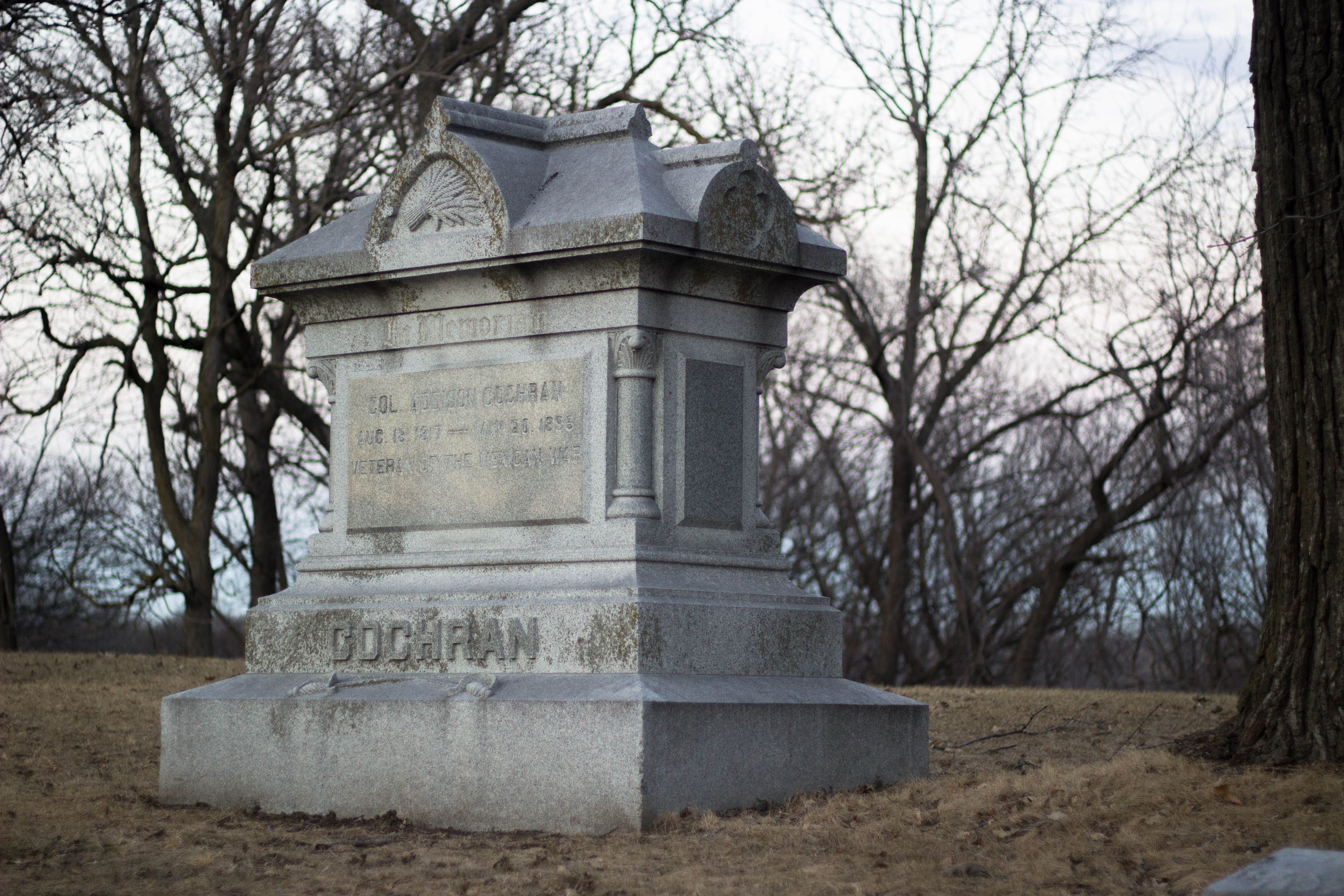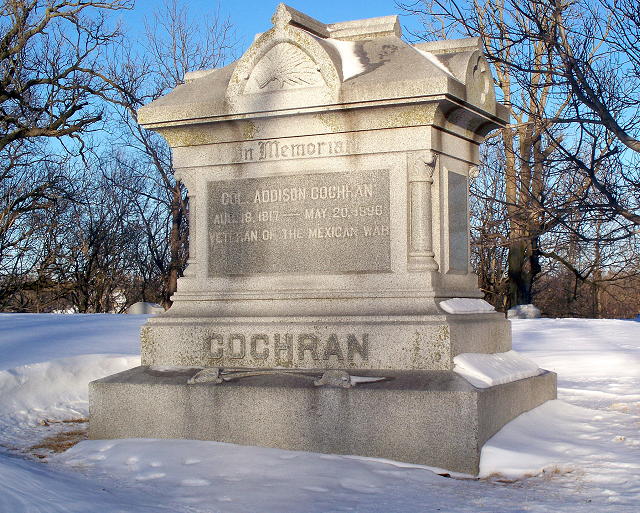-----------------
Find A Grave contributor genienuts 1976 provided the following information 20171123:
COLONEL ADDISON COCHRAN – The death of Colonel Addison Cochran, a distinguished soldier and pioneer occurred at Little Sioux, Harrison county, on the 20th of May. He was one of the most noted of the settlers of western Iowa, and one who has left his mark upon the times in which he lived. Born in Virginia in 1816, his early days were passed, after attaining to manhood in that state and in South Carolina, in commercial pursuits. He then removed to Arkansas and soon after enlisted in a regiment raised in that state for the Mexican war, he being at first its lieutenant-colonel, afterwards its colonel. He took part in the contests on the Rio Grande and was present at the battle of Buena Vista, and was one of the bravest of the brave in the famous cavalry charge which insured the defeat of the Mexican army. The war over, he devoted himself to other pursuits in the western territories, residing several years at Santa Fe. Then in 1854 he came to Iowa and settled in Council Bluffs. He at once engaged in the real estate business, bought and sold great quantities of land and city property, and died the owner of many thousands of acres of farming lands as well as of many city buildings and lots. His largest purchases of the former were in Harrison county, and here he owned a grain and stock farm of large extent. He was an intensely southern man in his feelings, and perhaps it was for that reason he passed most of his time during the war in mining operations in Colorado. Returning to Council Bluffs in 1866, he has left his mark in many directions upon that city. He was mainly instrumental, while Mayor, in the establishment of Fremont Park, and other important improvements, and at a later day he donated to the city a smaller park which has since been greatly improved, and bears his name. He was a wonderfully, reticent man as to all his personal affairs, and only his most intimate friends could gain any knowledge in reference to them. A wife whom he married in early life, and also a son born to them, were removed by death as were also brothers and sisters, mid only nephews and nieces remained, among whom he divided his large estate by will, in equal proportion. His funeral took place in Council Bluffs on the 33nd of May, and his remains were laid to rest in Fairview Cemetery. A suitable monument will be erected over them on the summit of the bluff, overlooking, for a long distance, the surrounding country, upon which he was went to gaze during his lifetime with so much pleasure.
D. C. BLOOMER.
source of obituary (verbatim transcription): “Annals of Iowa”, 3rd series, volume II, issue 6, July, 1896, pages 484 - 485
---------------------------------------
ADDISON COCHRAN, or Colonel Cochran, as he is familiarly called, is a highly respected citizen of Little Sioux township, and is the largest land-owner in Harrison County. Came to Iowa in 1849 on an exploring expedition, and became a permanent settler in 1854, when the land came into market, and in September of that year Mr. Cochran attended the land sale at Council Bluffs and assisted the settlers in securing land in this section. He entered it in his own name, and gave the settlers one year’s time, they paying him forty per cent interest (which was common at that date), and he giving them a bond for a deed. A quarter section of land at Government price, at the end of the year, with even this high rate of interest added, only cost $280.
At this same sale Col. Cochran purchased a claim and located three hundred and seventeen acres at Sioux City, the same now being owned by the stock yards company. The original cost of this land was $396.25, which, together with compound interest and taxes, amounted in 1887 to $8,000. He sold the tract for the handsome sum of $100,000.
Our subject has made his home here since 1883, but has always had a home at Council Bluffs, and still holds the same. Beyond question, no one man owns the amount of land in this county that Col. Cochran possesses. He has seven thousand acres. Five hundred acres of this land are under a high state of cultivation. His whole landed estate is surrounded with a fence, the total length of which (simply to enclose) is forty miles, saying nothing of the many miles of subdividing fences running hither and yon over this land.
His home farm contains five thousand acres, all in grass. The Colonel’s time and special attention is turned in the direction of raising, grazing and breeding stock. He has one hundred head of horses, mares and colts, and about six hundred head of cattle, together with three hundred head of Poland-China hogs.
In 1883 our subject built a bridge over the Little Sioux River, which meanders through his farm. This bridge was built for him and for his special private use. It was constructed by the Council Bluffs Bridge Company, the material being wrought iron. It is two hundred and sixty feet long by eighteen feet wide, and rests on boiler iron piers three and one-half feet in diameter, filled with cement. These go down to the hardpan. The cost of this bridge was $6,000, which is the most expensive outlay of any private bridge in the West. This bridge connects his lands on either side of the Little Sioux River.
Of Mr. Cochran’s ancestors, it may be said they were from Scotland, and emigrated to Lancaster County, Pa., settling at Cochransville, one hundred and fifty years ago. His grandfather emigrated to Virginia and settled in Loudon County, where our subject was born August 18, 1817, forty miles west from the city of Washington. Our subject is the second of a family of eleven children, two of whom are living.
Politically, Col. Cochran is a stanch supporter of the Democratic party. The only office he has ever allowed his name to be used for, in the West, was the office of Mayor of Council Bluffs, and during his administration and under his supervision the street grade was established. He was also instrumental in having the water works put in. Warrants at that time were only worth forty cents on a dollar, but at the end of his administration they were held at par.
He of whom this notice is written forms an important character in the history of Harrison County, where he is well and favorably known in almost every one of the twenty townships comprising the county.
He is an enthusiastic worker in his political party, ever being ready to adopt any honorable means for the purpose of electing the one who, in his judgment, is the proper candidate. As an example of his loyal party zeal, it may be said that when Gov. Boies was campaigning the State prior to his election, in the autumn of 1891, he was billed for Onawa, and the Colonel, at his own expense, chartered a car from River Sioux to Onawa, swinging the doors wide open, free to all to go and hear the Governor speak, which secured him some more votes at least.
This is but one of many similar cases wherein the true, broad-minded, liberal and enterprising spirit of Col. Cochran has been manifest, the same being an index to the secret of his success, both financially and socially.
source of portrait and biographical sketch: “History of Harrison County, Iowa”, 1891, biographical sketch on pages 357 - 358, portrait on page 356
Contributor: Genie Nuts 1976 (47118364) • [email protected]
———————-
ADDISON COCHRAN
Colonel Cochran, as he was universally styled throughout this section, was a prominent man on the Little Sioux, who came to Iowa in 1849 on an exploring expedition and became a permanent settler in 1854. He attended the land sale at Council Bluffs that year and secured large tracts in his own name and then sold off to less fortunate land-seekers, charging them, however, forty per cent interest, giving them a bond for a deed. Even at that a quarter section cost the purchaser only two hundred and eighty dollars. He also claimed a half section where now stands the stock yards at Sioux City. All told, up to 1887, this land, taxes and all, had cost him eight thousand dollars, but he sold it for a clean one hundred thousand dollars. Colonel Cochran always maintained a home at Council Bluffs, but much of his time was spent on his Little Sioux homestead. He was mayor of Council Bluffs several years. In 1892 he owned seven thousand acres of land in Iowa, six hundred acres of which was in a high state of cultivation. His land was all enclosed with fences, the aggregate length of the same being forty miles, besides the many sub-division fences. His home farm alone contained five thousand acres. In 1883 Colonel Cochran built an iron bridge over the Little Sioux which stream runs through the tract of land he owned, the cost of this private bridge being more than six thousand dollars. Colonel Cochran was a bachelor and lived well. He had many friends and plenty of servants at his command. He was of the old-school type of country gentleman. Politically, he was an avowed Democrat without alloy. He died several years since, highly respected by all who knew of his charming manners and genial hospitality.
source of biographical sketch: “History of Harrison County, Iowa: its people, industries and institutions, with biographical sketches of representative citizens and genealogical records of many of the old families”, 1915, page 661
Contributor: Genie Nuts 1976 (47118364)
-----------------
Find A Grave contributor genienuts 1976 provided the following information 20171123:
COLONEL ADDISON COCHRAN – The death of Colonel Addison Cochran, a distinguished soldier and pioneer occurred at Little Sioux, Harrison county, on the 20th of May. He was one of the most noted of the settlers of western Iowa, and one who has left his mark upon the times in which he lived. Born in Virginia in 1816, his early days were passed, after attaining to manhood in that state and in South Carolina, in commercial pursuits. He then removed to Arkansas and soon after enlisted in a regiment raised in that state for the Mexican war, he being at first its lieutenant-colonel, afterwards its colonel. He took part in the contests on the Rio Grande and was present at the battle of Buena Vista, and was one of the bravest of the brave in the famous cavalry charge which insured the defeat of the Mexican army. The war over, he devoted himself to other pursuits in the western territories, residing several years at Santa Fe. Then in 1854 he came to Iowa and settled in Council Bluffs. He at once engaged in the real estate business, bought and sold great quantities of land and city property, and died the owner of many thousands of acres of farming lands as well as of many city buildings and lots. His largest purchases of the former were in Harrison county, and here he owned a grain and stock farm of large extent. He was an intensely southern man in his feelings, and perhaps it was for that reason he passed most of his time during the war in mining operations in Colorado. Returning to Council Bluffs in 1866, he has left his mark in many directions upon that city. He was mainly instrumental, while Mayor, in the establishment of Fremont Park, and other important improvements, and at a later day he donated to the city a smaller park which has since been greatly improved, and bears his name. He was a wonderfully, reticent man as to all his personal affairs, and only his most intimate friends could gain any knowledge in reference to them. A wife whom he married in early life, and also a son born to them, were removed by death as were also brothers and sisters, mid only nephews and nieces remained, among whom he divided his large estate by will, in equal proportion. His funeral took place in Council Bluffs on the 33nd of May, and his remains were laid to rest in Fairview Cemetery. A suitable monument will be erected over them on the summit of the bluff, overlooking, for a long distance, the surrounding country, upon which he was went to gaze during his lifetime with so much pleasure.
D. C. BLOOMER.
source of obituary (verbatim transcription): “Annals of Iowa”, 3rd series, volume II, issue 6, July, 1896, pages 484 - 485
---------------------------------------
ADDISON COCHRAN, or Colonel Cochran, as he is familiarly called, is a highly respected citizen of Little Sioux township, and is the largest land-owner in Harrison County. Came to Iowa in 1849 on an exploring expedition, and became a permanent settler in 1854, when the land came into market, and in September of that year Mr. Cochran attended the land sale at Council Bluffs and assisted the settlers in securing land in this section. He entered it in his own name, and gave the settlers one year’s time, they paying him forty per cent interest (which was common at that date), and he giving them a bond for a deed. A quarter section of land at Government price, at the end of the year, with even this high rate of interest added, only cost $280.
At this same sale Col. Cochran purchased a claim and located three hundred and seventeen acres at Sioux City, the same now being owned by the stock yards company. The original cost of this land was $396.25, which, together with compound interest and taxes, amounted in 1887 to $8,000. He sold the tract for the handsome sum of $100,000.
Our subject has made his home here since 1883, but has always had a home at Council Bluffs, and still holds the same. Beyond question, no one man owns the amount of land in this county that Col. Cochran possesses. He has seven thousand acres. Five hundred acres of this land are under a high state of cultivation. His whole landed estate is surrounded with a fence, the total length of which (simply to enclose) is forty miles, saying nothing of the many miles of subdividing fences running hither and yon over this land.
His home farm contains five thousand acres, all in grass. The Colonel’s time and special attention is turned in the direction of raising, grazing and breeding stock. He has one hundred head of horses, mares and colts, and about six hundred head of cattle, together with three hundred head of Poland-China hogs.
In 1883 our subject built a bridge over the Little Sioux River, which meanders through his farm. This bridge was built for him and for his special private use. It was constructed by the Council Bluffs Bridge Company, the material being wrought iron. It is two hundred and sixty feet long by eighteen feet wide, and rests on boiler iron piers three and one-half feet in diameter, filled with cement. These go down to the hardpan. The cost of this bridge was $6,000, which is the most expensive outlay of any private bridge in the West. This bridge connects his lands on either side of the Little Sioux River.
Of Mr. Cochran’s ancestors, it may be said they were from Scotland, and emigrated to Lancaster County, Pa., settling at Cochransville, one hundred and fifty years ago. His grandfather emigrated to Virginia and settled in Loudon County, where our subject was born August 18, 1817, forty miles west from the city of Washington. Our subject is the second of a family of eleven children, two of whom are living.
Politically, Col. Cochran is a stanch supporter of the Democratic party. The only office he has ever allowed his name to be used for, in the West, was the office of Mayor of Council Bluffs, and during his administration and under his supervision the street grade was established. He was also instrumental in having the water works put in. Warrants at that time were only worth forty cents on a dollar, but at the end of his administration they were held at par.
He of whom this notice is written forms an important character in the history of Harrison County, where he is well and favorably known in almost every one of the twenty townships comprising the county.
He is an enthusiastic worker in his political party, ever being ready to adopt any honorable means for the purpose of electing the one who, in his judgment, is the proper candidate. As an example of his loyal party zeal, it may be said that when Gov. Boies was campaigning the State prior to his election, in the autumn of 1891, he was billed for Onawa, and the Colonel, at his own expense, chartered a car from River Sioux to Onawa, swinging the doors wide open, free to all to go and hear the Governor speak, which secured him some more votes at least.
This is but one of many similar cases wherein the true, broad-minded, liberal and enterprising spirit of Col. Cochran has been manifest, the same being an index to the secret of his success, both financially and socially.
source of portrait and biographical sketch: “History of Harrison County, Iowa”, 1891, biographical sketch on pages 357 - 358, portrait on page 356
Contributor: Genie Nuts 1976 (47118364) • [email protected]
———————-
ADDISON COCHRAN
Colonel Cochran, as he was universally styled throughout this section, was a prominent man on the Little Sioux, who came to Iowa in 1849 on an exploring expedition and became a permanent settler in 1854. He attended the land sale at Council Bluffs that year and secured large tracts in his own name and then sold off to less fortunate land-seekers, charging them, however, forty per cent interest, giving them a bond for a deed. Even at that a quarter section cost the purchaser only two hundred and eighty dollars. He also claimed a half section where now stands the stock yards at Sioux City. All told, up to 1887, this land, taxes and all, had cost him eight thousand dollars, but he sold it for a clean one hundred thousand dollars. Colonel Cochran always maintained a home at Council Bluffs, but much of his time was spent on his Little Sioux homestead. He was mayor of Council Bluffs several years. In 1892 he owned seven thousand acres of land in Iowa, six hundred acres of which was in a high state of cultivation. His land was all enclosed with fences, the aggregate length of the same being forty miles, besides the many sub-division fences. His home farm alone contained five thousand acres. In 1883 Colonel Cochran built an iron bridge over the Little Sioux which stream runs through the tract of land he owned, the cost of this private bridge being more than six thousand dollars. Colonel Cochran was a bachelor and lived well. He had many friends and plenty of servants at his command. He was of the old-school type of country gentleman. Politically, he was an avowed Democrat without alloy. He died several years since, highly respected by all who knew of his charming manners and genial hospitality.
source of biographical sketch: “History of Harrison County, Iowa: its people, industries and institutions, with biographical sketches of representative citizens and genealogical records of many of the old families”, 1915, page 661
Contributor: Genie Nuts 1976 (47118364)
Family Members
Advertisement
Advertisement
